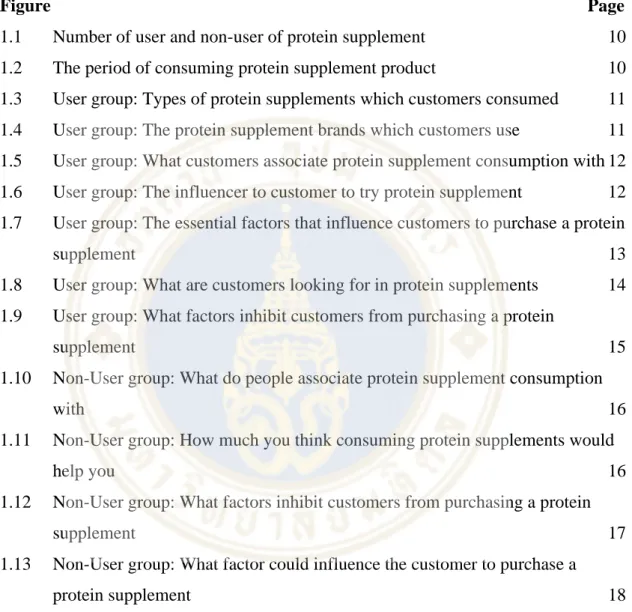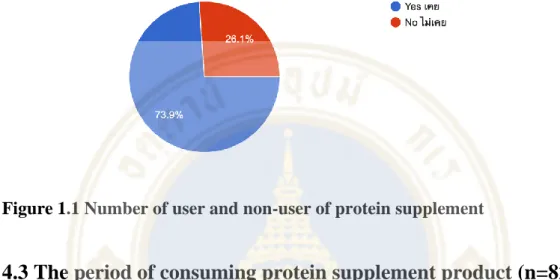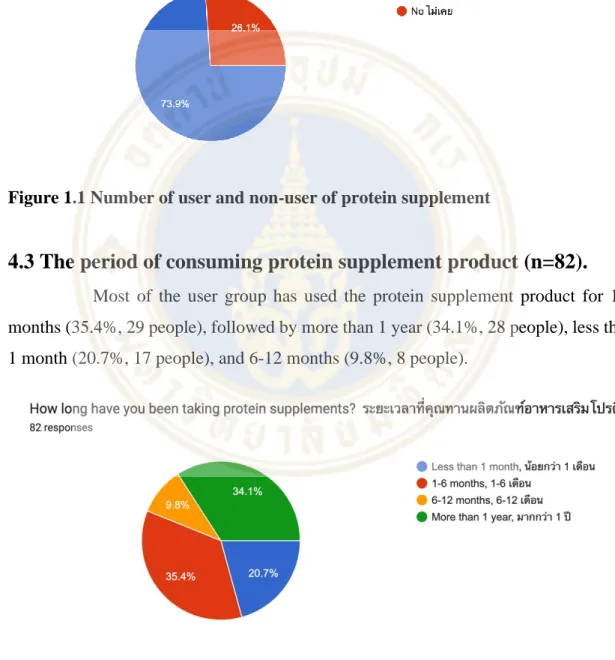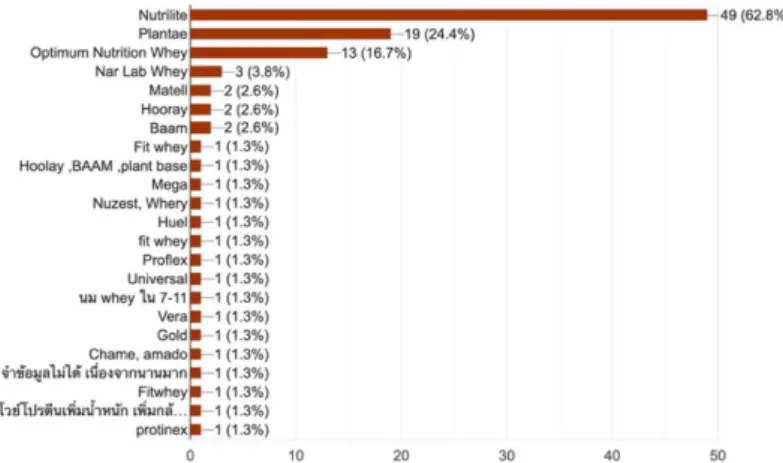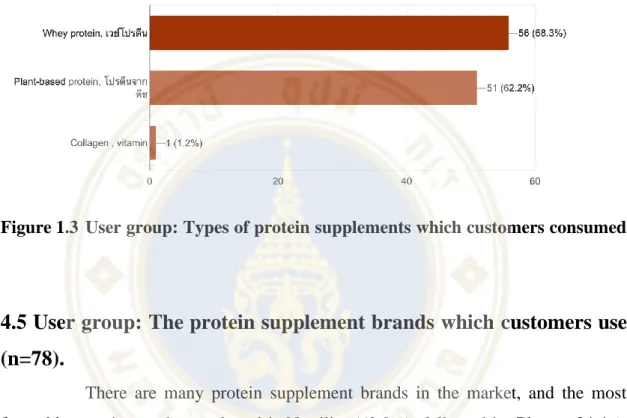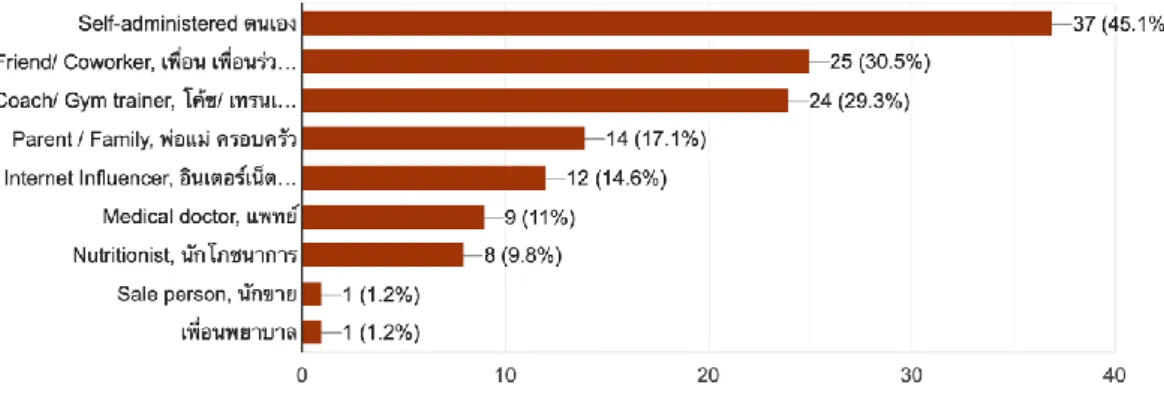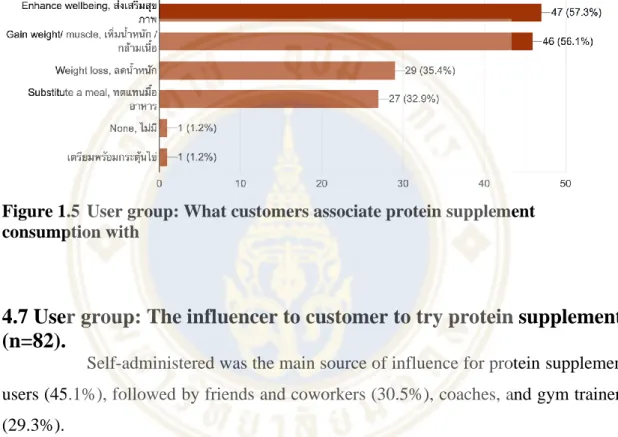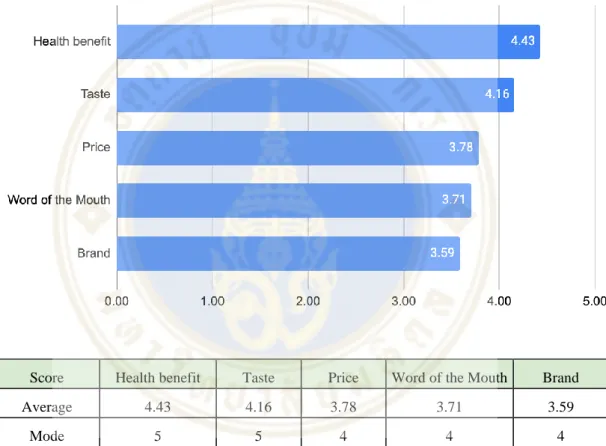The purpose of this research is to investigate the enabling factors that influence customers' intention to purchase protein supplements, the barrier factors that inhibit customers' intention to purchase protein supplements, and to examine the differences in the perception of protein supplements between users and non-users of the product. The sample size is 111 respondents from different backgrounds, from protein supplement users and non-users, and distributed to people in the Bangkok area. Side effects are the most important for the users and non-users group, followed by taste and price, which are slightly different from the non-users group in terms of side effects, price and taste.
According to Fortune Business Insights, the global protein supplement market will grow from USD 14.05 billion in 2021. According to market trends, many companies have started to manufacture and sell protein supplements to customers. As a necessary consequence, more information about people's protein consumption, the product the customer wants, and the factors that influence the purchase of protein supplements can lead to competitive business advantages for a company.
Therefore, the researcher is expected to investigate the factors that influence and inhibit customers' intention to purchase protein supplements, as well as to gain a better understanding of customer behavior regarding protein supplement consumption in Bangkok, Thailand, between product users and non-users. What are the differences in perception of protein supplements between product users and non-users. To investigate the drivers and the barriers factors that the customer's intention to purchase protein supplements.
To investigate the differences in perception of protein supplements between product users and non-users.

Expected Benefits
LITERATURE REVIEW
- Protein Supplements
- Health consciousness
- Word of mouth (WOM)
- Brand trust
- Side effect
A health-conscious individual, as evidenced by Gould's aspect, often finds a source of healthy and fresh food or supplements that contain nutrition and vitamins. Furthermore, consumers' purchasing behavior for healthy products is influenced by their level of health consciousness (Lockie, 2002). Furthermore, according to 2020 research in Slovakia, health awareness increased dramatically during the Covid 19 pandemic, women are more health conscious than men, and older consumers are more health conscious than younger consumers (Cvirik, 2020).
The consumer's intention to discuss the recommended products and services with other customers after purchase is called word of mouth (Zeithaml, 1996). The Word of the Month is determined by a consumer's level of satisfaction with a product or service, which leads to recommendations for others (Maxham, 2001). Furthermore, the word of the month influences the purchasing decisions of customers who have successfully purchased the product (Gulfraz, 2022).
Consumers who are unfamiliar with a product or its outcome often seek additional information to reduce uncertainty and eliminate risks (Jeong, 2015). Word of mouth is one of the essential communication strategies to promote brands and products (Lopez & Sicilia, 2014), which helps customers make purchase decisions and helps customers avoid doubts about purchases. According to research in 2015, Protein supplement satisfaction had a positive effect on word-of-mouth intention, and word-of-mouth intention had a positive effect on repurchase intention.
Furthermore, the findings revealed that customer intake satisfaction and repurchase intention were completely mediated by word-of-mouth intention (Kim, Han-Na & Na, Kwan-Sik, 2015). Brand trust can be defined as consumers' willingness to rely on a brand because they believe in the brand's reliability, honesty and altruism (Wang, 2002). Brand trust depends on consumers' belief that the brand will provide the product value and reliability, which helps consumers maintain satisfaction and brand trust in the product.
If consumers feel the sincerity of the business to sell the brand's products, this will increase consumers' willingness to repurchase them (Ballester, 2003). Furthermore, customers prefer to repurchase the same brand rather than an alternative because the brand makes them feel safe or satisfied, and the brand can solve their problems (Sunyansanoa, 2013). Additionally, for people who do not have other health conditions, a high-protein diet may not increase the risk of kidney damage.
RESEARCH METHODOLOGY
Research Design
Data Collection and Sample
Research Instrument
RESEARCH FINDINGS
- Demographic Analysis and General Information of Respondents
- Number of user and non-user of protein supplement (n=111)
- The period of consuming protein supplement product (n=82)
- User group: Types of protein supplements which customers consumed (n=82)
- User group: The protein supplement brands which customers use (n=78)
- User group: What customers associate protein supplement consumption with (n=82)
- User group: The influencer to customer to try protein supplement (n=82)
- User group: The essential factors that influence customers to purchase a protein supplement (n=82)
- User group: What are customers looking for in protein supplements (n=82)
- User group: What factors inhibit customers from purchasing a protein supplement (n=82)
- Nonuser group: What do people associate protein supplement consumption with (n=29)
- Nonuser group: How much you think consuming protein supplements would help you (n=29)
- Nonuser group: What factors inhibit customers from purchasing a protein supplement (n=29)
- Nonuser group: What factor could influence the customer to purchase a protein supplement (n=29)
Most of the participants have experience with consuming protein supplements, 82 people (73%), while 29 people (26.1%) have never consumed protein supplements. Whey protein (68.3%) and vegetable protein (62.2%) are the most popular protein supplements among customers. There are many protein supplement brands on the market, but the most affordable protein supplement brand is Nutrilite (62.8%), followed by Plantae at 24.4% and Optimum Nutrition Whey at 16.7%.
The user mostly associates the consumption of protein supplements with improved well-being (57.3%), weight or muscle gain (56.1%) and weight loss (35.4%). Self-administration was the main source of influence for protein supplement users (45.1%), followed by friends and colleagues (30.5%), trainers and gym trainers (29.3%). Out of 5 points, the most decisive factor influencing customers to buy a protein supplement is health benefit (4.43 points) with a mode score of 5, followed by taste (4.16 points) with a mode score of 5 and price (3.78 points) with the result of mode 4.
Out of 5 scores, most of the customers searched for good nutrition of the protein supplement products (4.43 scores) with a condition score of 5, Ingredients (4.24 scores) with a condition score of 5 and followed by flavors (3.98 scores) with a condition score of 4. The main factor inhibiting users from purchasing protein supplement products is the side effect with a 4.32 score out of 5 with a condition score of 5, followed by a taste score of 4.04 with a condition score of 5 and price 3.73 score with a condition score of 4. Most non-users associate protein supplement consumption with gaining weight or muscle (69%), improved well-being (51.7%), and replacing a meal (35.4%).
The result of how much the non-user group believes that consuming protein supplements would help them shows that the majority of non-users believe that protein supplements would help them moderately (37.9%), followed by many (24.1 %) and a little (20.7%). The main factors preventing non-users from purchasing protein supplements are side effect, with an average score of 4.11 and mode score of 5, followed by price, with an average score of 4.07 points, mode score of 4 out of 5, and average taste 3.89 points out of 5, a mode score of 4. The most important factor that may influence a non-user to buy a protein supplement is the health benefit (4.11 points) with a mode score of 4, followed by price ( 3.86 points), word of mouth and taste with the same result (3.78 points).
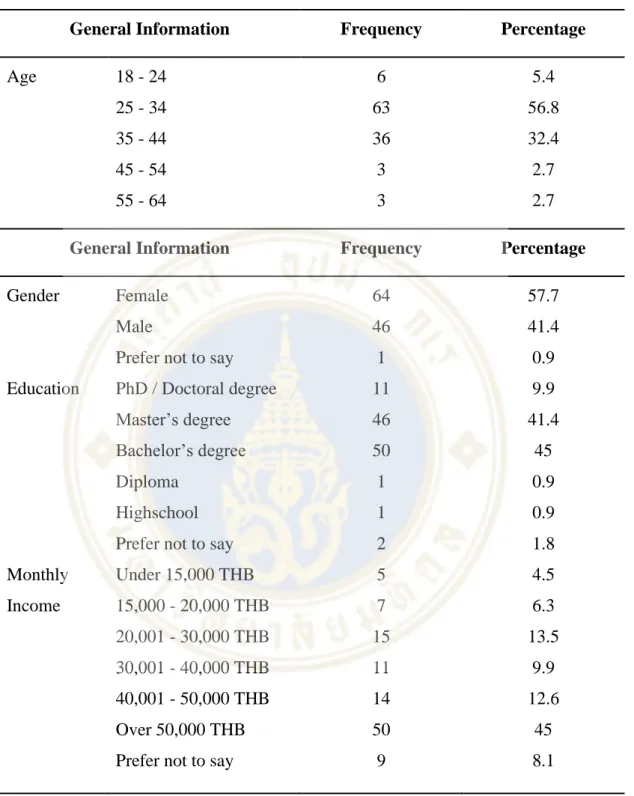
CONCLUSION
Conclusion
The main impact on users was self-administered, implying that many people are interested and looking for a good protein supplement product to consume in the market. More user knowledge from the user's period of using the product, the most frequent user of the period using the protein product is 1-6 months. This shows that protein supplements can attract many new customers nowadays, with the group that has been using them for more than a year in second place.
Furthermore, most non-users do not buy protein supplements because they believe they will only help them at a moderate level. Consequently, if we provide more information about how well the protein supplement improves their well-being at a reasonable price, and with numerous reviews from previous customers, we can increase the possibility of consumers' intention to purchase protein supplements.
Recommendations
Limitations and Suggestions for Future Research
Combined effects of valence and attributes of e-WOM on consumer judgment of message and product: The moderating effect of brand community type. Combined_effects_of_valence_and_attributes_of_e-WOM_on_consumer_judgment_for_message_and_product. Young men's use of protein powder and muscle-building supplements in their quest for muscle strength.
An investigation of the relationship between level of satisfaction with protein supplement intake and repurchase intention: Verification of mediating effects of word-of-mouth intention. Growth of the nutritional supplements and nutrients market during the coronavirus pandemic – implications for consumers and regulatory oversight. Effects of protein supplementation on muscle damage, soreness and recovery of muscle function and physical performance: A systematic review.
Whey protein supplementation improves body composition and cardiovascular risk factors in overweight and obese patients: a systematic review and meta-analysis.
APPENDICES
Interview Questions
Demographic
